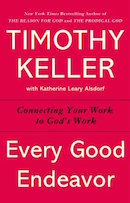Interview with Michael Card: Writer, Musician, Theologian
Blog / Produced by The High Calling
Michael Card is something of a Renaissance man—part musician, part teacher, part theologian, part writer, part inspirational speaker, and radio show host. The success of his career has certainly surprised him. He has written more than 19 number one hits, including songs like "El Shaddai" and "Emmanuel."
Recently, Michael Card began speaking and leading worship at Laity Lodge retreats. At one of the retreats, we sat down to talk with him about his latest book, A Better Freedom.
At Laity Lodge retreats, you've talked a lot about servants and slaves in conjunction with your new book. Can you tell us the difference between a servant and a slave in the Bible?
I think the words are just sort of nuanced. In Greek, they're different words. A "servant" or a "diakonos" is a person who has more choices. A "doulos," which is based on the word for being "bound" is more of what you and I would think of, traditionally, as a slave—a person who has no choice; who is owned by someone else; who's given up everything, or at least, maybe everything had been taken away from him or her.
Can you talk about slavery in the New Testament, specifically?
First of all, we looked at the fact that Old Testament slavery and New Testament slavery were two fundamentally different things.
New Testament slavery was very severe—more of what you and I would have thought African-American slavery was like. There were virtually no laws to protect the slave. And, what laws there were, were usually disregarded—slaves were mutilated, branded, collared. There was not much hope.
But, there were those slaves who were at the higher echelons, who were professional people—house servants, doctors, lawyers, skilled craftsmen—who did have some hope of getting out. It was a fairly complex system.
There seem to be a lot of passages about masters and slaves. Why is this such a prevalent image in the New Testament?
That's the reason I sort of centered on the subject. It is a really pervasive image, especially owing to the fact that everyone identifies themselves as a slave or identifies themselves with slaves. I mean, Peter, Paul, John, James, Jude, Mary, Jesus' own mother, Simeon, the angel in Revelation. John falls down before the angel, and Simeon says, "I'm just a slave like you; don't do this." And then, most especially of course, Jesus, who Philippians 2 says came in the form of a "doulos," a slave.
When we read these passages, I tend to read the slave and master passages thinking about myself as an employee which is not at all fair to my employer because he doesn't treat me like a slave.
Maybe I need to talk to some of your employees!
[laughing] I don't have any. But I wonder, is there a danger in reading these passages through the lens of our workplaces?
No, not necessarily. First of all, I want people to read these passages any time and any way they can. And, the advice, especially in the household codes that Paul gives to masters, is basically great advice to a modern-day boss.
Paul says they should remember that they have a master; they have a boss, and that's Christ. And, they're subject to Him. He sees everything they do. And, they're to be kind to the slaves, and that sort of thing.
And, likewise to slaves, Paul talks about showing respect to their masters and not doing things just to be seen—not being people pleasers. It's a wonderful word to modern-day bosses and employees.
In your book, you talk about "eye slaves." Can you explain what you mean by that phrase?
I love the word; and Paul uses it twice, once in Colossians and once in Ephesians: the Greek word—ophthalmos—"eye," doulia comes from doulos, the word for "slave." When you translate that word into English, it becomes a whole sentence. It means, "those who do things only when people are watching them."
I don't know about you, Marcus, but for me, I resonated with that, because I'm an eye slave. Sometimes I do things just because I know people are watching me. If no one was watching, I wouldn't do it.
Paul says that in the household codes; but then, Jesus says the same sort of thing in Luke 22, when he says don't do things to be seen by men. Don't be like the Gentiles who lord it over each other. You're not supposed to be that way. Jesus says you're called to be slaves; you're called to be servants. It's not like that with you. You shouldn't be that way.
Romans referred to slaves as "talking tools."
Yes.
At TheHighCalling.org and at Laity Lodge, we hear from a lot of people who feel like they are nothing more than "talking tools." They feel like they're dehumanized by their work. What would you say to these people? What does the Bible say to these people?
Well, it may be true. They may be dehumanized. They may be looked upon as tools of production. I think that's probably true of a lot of companies and a lot of bosses. But, I think the word of Scripture to them is that Christ does give us, I've heard it called, a "concealed dignity" because I belong to Him, because He is my master.
Your boss doesn't own you. The big company you work for doesn't own you; but someone does. And, the Bible says He paid for you; He purchased you out of the marketplace, like a slave is purchased.
For those people who are feeling dehumanized, the Bible has a good word for them—you have a concealed dignity because someone else owns you. That would come as a good word to me, I think, if I was working for some huge corporation that treated me like a guinea pig or something. Someone else owns me, and it's not my employer.
In your book, you talk about these slave stories and slave parables that Jesus told. And you say he was telling them to a culture of slaves.
Well, certainly. When he tells those parables, there are slaves standing around. Peter owned slaves; the rabbis owned slaves. It was a very common part of life in the first century.
And they were perfect exemplars because a slave was a person who was owned. A slave was a person who had a master. I think Jesus appeals to slaves so many times in his parables because that's a big part of the point he's trying to get across. We have a master who owns us.
I have to admit that it is hard for me to think of myself as being owned.
Before people who are reading this get too upset, we need to realize that Jesus is redeeming that image of slavery. It's not the brutal institution of Roman slavery or African-American slavery that I use for examples. It's a completely different relationship. Just as He redeemed the cruel image of the cross and made it so meaningful, He's redeemed this image of slavery.
So the image of New Testament slavery is parallel to the image of taking up a cross.
It is. And the cross is the way slaves were executed. The cross is a slave death. Jesus dies a slave death.
But we live in a culture of masters. How do we then listen to these stories?
I would say that we live in a culture of people who live as if they were masters. But in fact, like you said before, a lot of people feel that they are slaves. And the people who live as if they were the masters need to realize that's all an illusion.
So much of the world that we live in is illusory. That is why we always turn to the Scripture and listen to what the Scripture has to say to us. It says we belong to someone else. And this is whether we've said "yes" to Christ or not. John tells us that Jesus died for the sins of the whole world.
Even people who don't know Jesus have been purchased by Jesus. He died for their sins; He purchased them. And that gives Him the right to judge us in the last day. Because He's paid for our sins, He can judge us in the last day.
So, I think that's my word to Christians and non-Christians—you're owned. You have a master. If you haven't thought about your relationship with your master, it is something you need to meditate about.
At Laity Lodge you've talked about the "Servant Savior"—or the master who humbles himself to become a slave. In the Foundation, we talk a lot about servant leadership. How is a "Servant Leader" different from the "Servant Savior."
Jesus is the "Servant Savior," but he is also a servant leader.
Of course, that was a problem with the disciples. They were looking for a different kind of a leader who would exercise authority. Specifically, they were hoping for someone who would kill the Romans. They never dreamed that Jesus would die for the Romans. That was unimaginable to them.
It's a good thing that you guys focus on servant leadership, because not only is it effective leadership when we serve each other and wash each other's feet the way Jesus washed His disciples' feet—but I think in a biblical sense, it's the only kind of real leadership there is. There is no other kind of leader than a person who humbles himself.
Is the Greek word for "leader" the same as the Greek word for "master"?
Kurios means "master, lord, owner."
What's the state of slavery in the world today?
Slavery isn't a thing of the past. There are more slaves now than there have ever been in the world. Even in the U.S., there are slaves—largely Hispanics. But, there's a huge sex slave trade in people of all ethnicities. And there is slavery in places like India and Africa. There are literally millions and millions of slaves in the world right now.
As Christians, what can we do about slavery in the world?
Well, praying is always important. International Justice Mission is a good place to find out what you can do.
I worked for an organization called World Serve. World Serve is a ministry that works in closed and restricted countries. World Serve, in serving the Church in those countries, helps people who are enslaved.
But again, it is so important to pray for them.
--------------------------------------------------------------------
Read more about Michael Card on his website http://www.michaelcard.com.





